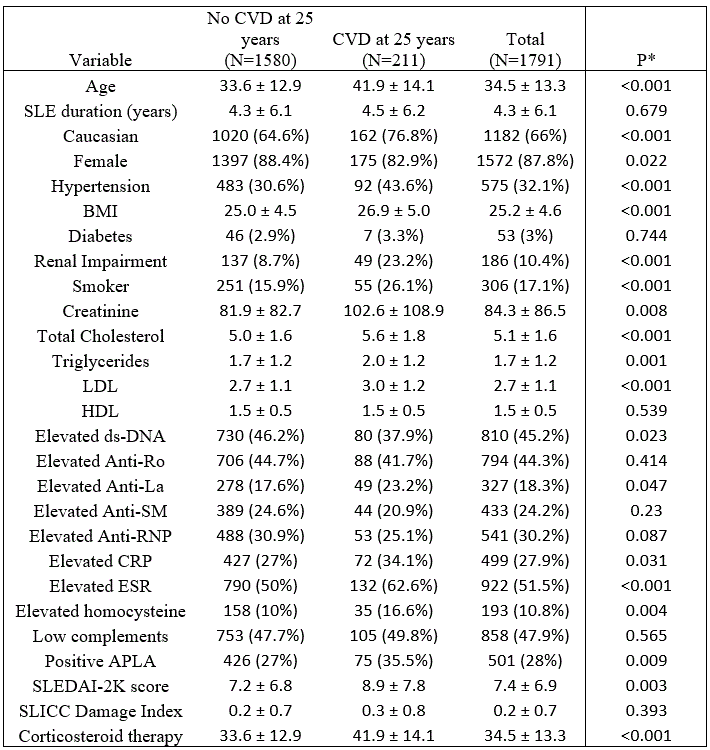Session Information
Date: Monday, November 13, 2023
Title: (1442–1487) SLE – Diagnosis, Manifestations, & Outcomes Poster II
Session Type: Poster Session B
Session Time: 9:00AM-11:00AM
Background/Purpose: Patients with systemic lupus erythematosus (SLE) have higher risks of developing cardiovascular disease (CVD). Traditional risk factors do not adequately capture the risk of CVD in patients with SLE, and although SLE-specific prediction risk tools have been developed, none has achieved an adequate combination of high sensitivity and specificity. Recently, machine learning techniques, such as random survival forests (RSF), were shown to be effective approaches for the prediction of cardiovascular outcomes in the general population. The purpose of this study was to evaluate the use of RSF in the prediction of CVD events in SLE patients.
Methods: A retrospective analysis was conducted on patients at a single Lupus centre between 1970 and 2018. For each patient, baseline demographic, clinical and laboratory variables were collected using a standard protocol. Multiple imputation by chained equations was used to impute missing variables. Patients were followed for up to 25 years, and CVD event was defined as the development of angina, myocardial infarction, congestive heart failure, stroke, transient ischemic attack, pacemaker insertion or peripheral vascular disease related to atherosclerosis. Patients who had CVD event at baseline, had no follow-up visits after initial visit, or had CVD death and no visits within 10 years prior to death were excluded. To evaluate the risks of developing CVD events, univariate and multivariate survival analyses were conducted using Cox proportional hazard models. In addition, RSF was constructed, and its performance was compared against the multivariate Cox model by calculating the integrated Brier score with bootstrap cross-validation.
Results: Out of the 1791 patients included in the final analyses, 211 (11.8%) developed CVD events over a mean follow-up period of 9.6 years. Patients who developed CVD tended to be older, had higher body mass index (BMI), LDL, homocysteine levels and disease activity, and were more likely to be male, Caucasian, smokers, on corticosteroid treatment, and have hypertension, renal impairment, elevated inflammatory markers, and positive antiphospholipid antibodies (Table 1). In multivariate Cox regression, age (HR=1.05, P< 0.001), BMI (HR 1.05, P< 0.000), LDL (HR 1.14, P=0.019), abnormal C-reactive protein (HR=1.36, P=0.040), abnormal erythrocyte sedimentation rate (HR 1.3, P= 0.072), elevated creatinine (HR=1.00, P< 0.001), SLEDAI-2K score (HR=1.04, P < 0.001), and corticosteroid treatment (HR=1.52, P=0.007) were associated with increased CVD risk. In the RSF model, the variables with the highest predictive values were: BMI, age, SDI, SLEDAI-2K score and serum creatinine (Figure 1). The integrated Brier score was 0.094 for the random survival forest model, compared to 0.100 for the Cox model, suggesting that the RSF yielded lower prediction errors (Figure 2).
Conclusion: RSF is a machine learning tool that could help improve the accuracy of CVD event prediction in SLE patients, and could lend insight into important predictors for CVD risk. The random survival forest yielded lower prediction errors compared to the multivariate Cox model.
Data presented as mean ± standard deviation for continuous variables, and N (percentage) for categorical variables. P values were derived from two-sample t-tests for continuous variables, and Chi-squared tests for binary variables.
BMI: Body mass index. LDL: Low-density lipoprotein. HDL: High-density lipoprotein. SLEDAI_2K: Systemic Lupus Erythematosus Disease Activity Index 2000. APLA: Antiphospholipid antibodies. SLICC: Systemic Lupus International Collaborating Clinics.
The greater the VIMP, the more impact a variable has on the prediction accuracy of a model. A value of 0 means that the variable has no impact on the model. A negative VIMP means that the variable decreases prediction accuracy. Tx: Treatment.
The reference model refers to the marginal Kaplan-Meier prediction model, where no variables were used for stratification. The integrated Brier score (IBS) is calculated based on the integration of the average squared differences between predicted and observed survival, and a lower score is suggestive of overall lower prediction error. The IBS was 0.094 for the random survival forest model, compared to 0.100 for the Cox model.
To cite this abstract in AMA style:
Liu H, Su J, Bonilla D, Duaibes S, Diaz Martinez J, Touma Z. Prediction of Cardiovascular Disease in Patients with Systemic Lupus Erythematosus Using a Machine Learning Algorithm for Time-to-Event Outcomes: Random Survival Forest [abstract]. Arthritis Rheumatol. 2023; 75 (suppl 9). https://acrabstracts.org/abstract/prediction-of-cardiovascular-disease-in-patients-with-systemic-lupus-erythematosus-using-a-machine-learning-algorithm-for-time-to-event-outcomes-random-survival-forest/. Accessed .« Back to ACR Convergence 2023
ACR Meeting Abstracts - https://acrabstracts.org/abstract/prediction-of-cardiovascular-disease-in-patients-with-systemic-lupus-erythematosus-using-a-machine-learning-algorithm-for-time-to-event-outcomes-random-survival-forest/



